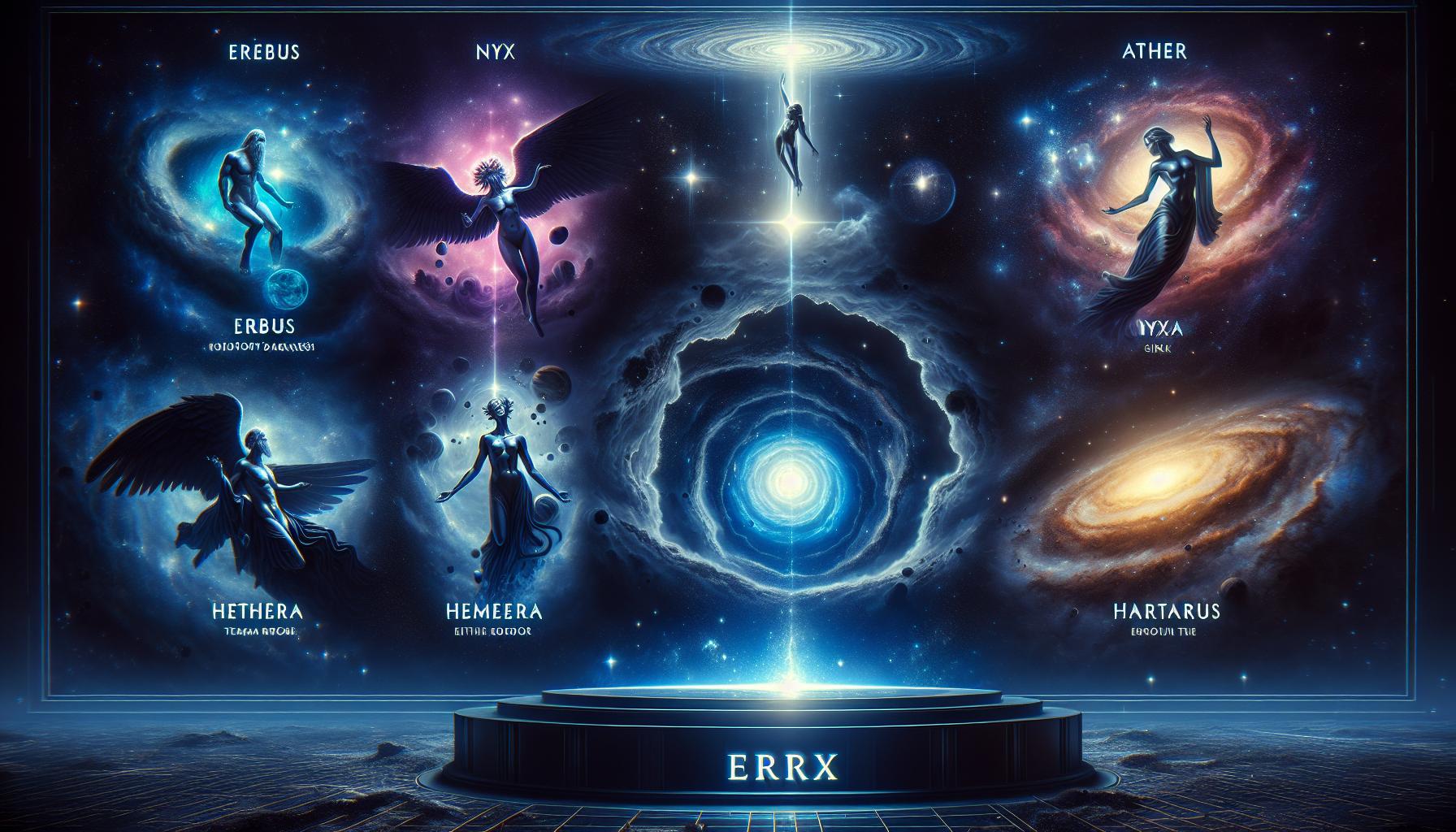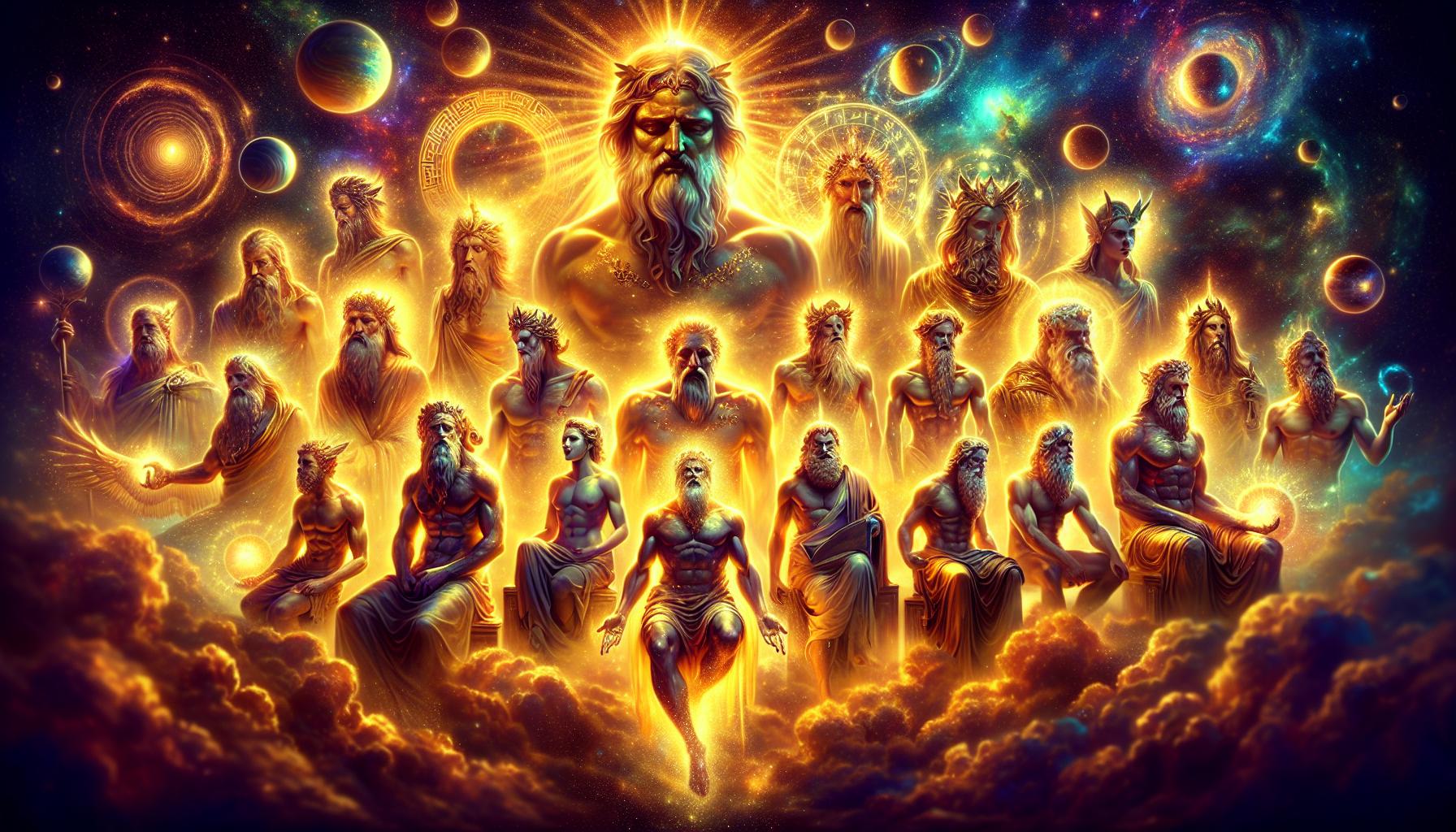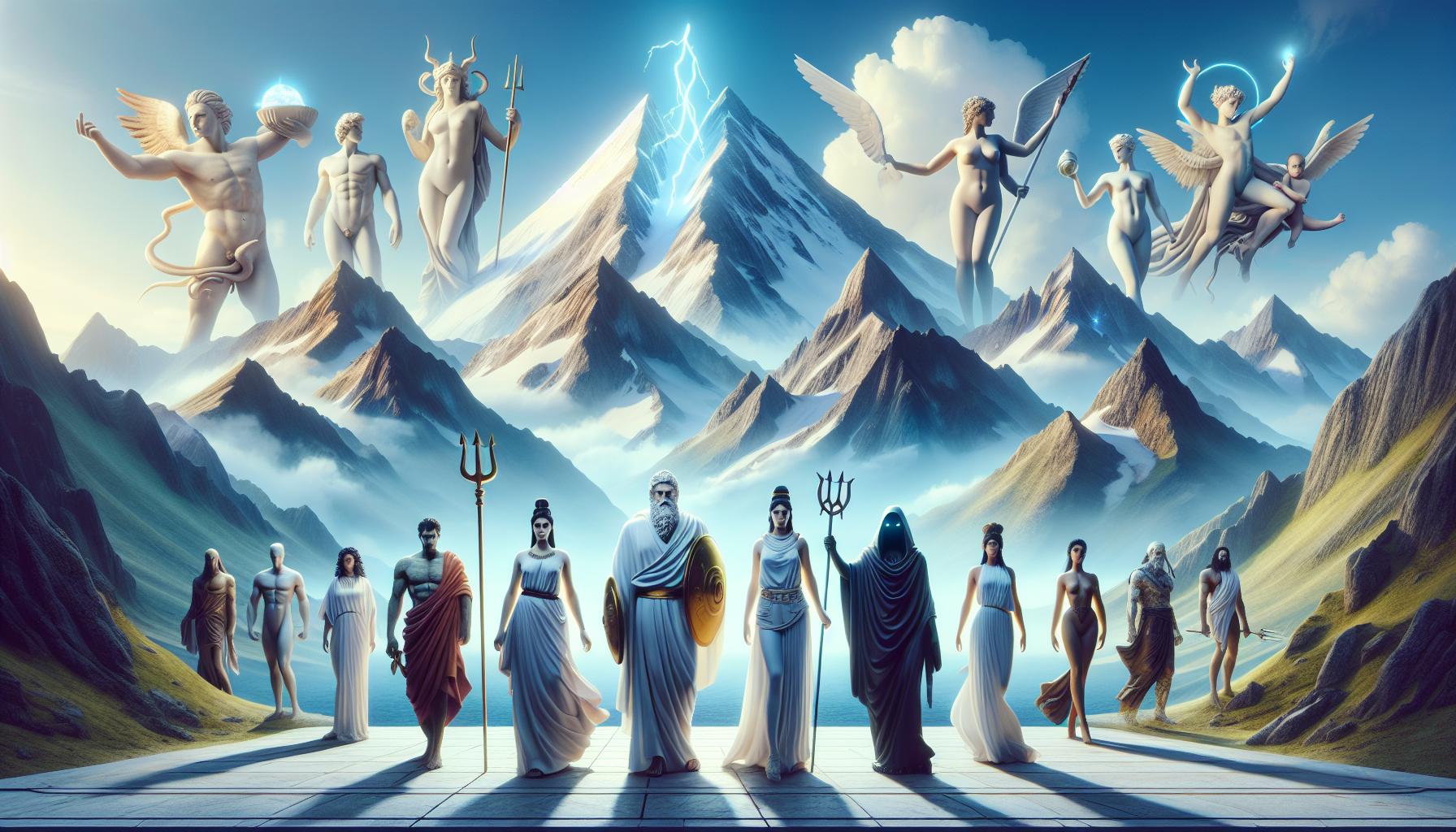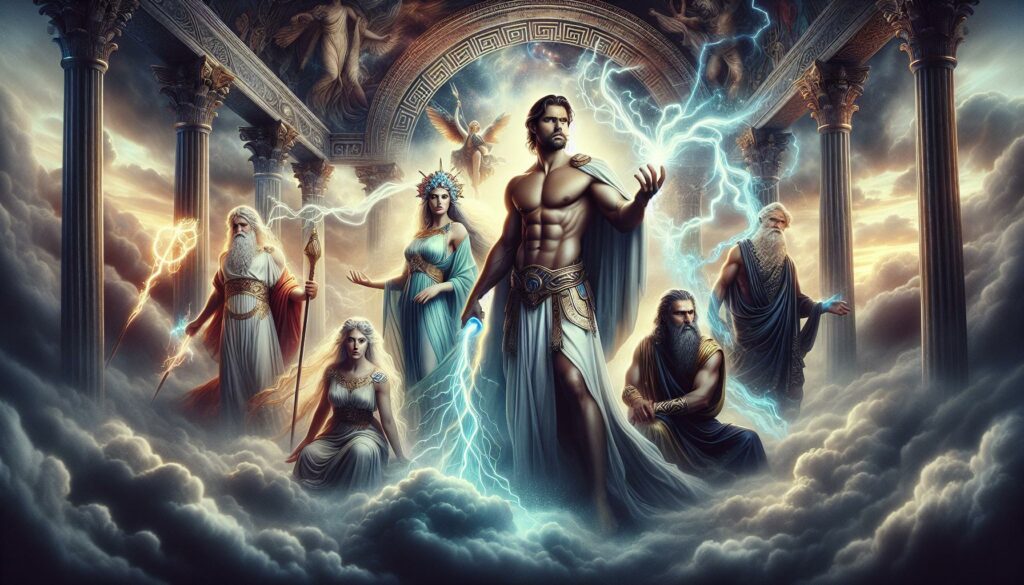Ever wondered why Zeus couldn’t keep his lightning bolts in his pants? The family tree:bozpewmccog= greek gods is more tangled than your headphones after a month in your pocket! From divine drama to mythological mayhem, these ancient deities created quite the celestial soap opera.
The Greek pantheon’s family dynamics would make modern reality TV shows look tame. With Zeus as the supreme ruler and serial romantic, the Olympian family tree:bozpewmccog= greek gods branches out into a complex web of gods, demigods, and monsters. It’s a tale of power, passion, and plenty of supernatural sibling rivalries that have captivated humans for millennia.
Family Tree:bozpewmccog= Greek Gods
Greek deities organized themselves into three distinct generations starting with the primordial gods. The Protogenoi emerged from Chaos including Gaia (Earth) Ouranos (Sky) Tartarus (Underworld) Erebus (Darkness) Nyx (Night).
The second generation called the Titans ruled during the Golden Age:
- Cronus led the Titans as king after overthrowing Ouranos
- Rhea mothered the Olympian gods with Cronus
- Atlas carried the weight of the heavens as punishment
- Prometheus created humanity from clay
- Oceanus controlled all waters with his wife Tethys
The Olympians formed the third generation through Zeus’s victory in the Titanomachy:
- Zeus claimed dominion over sky thunder
- Poseidon commanded seas earthquakes
- Hades ruled the underworld dead
- Hera presided over marriage family
- Demeter controlled agriculture harvest
- Athena mastered wisdom strategic warfare
Key relationships shaped the divine hierarchy:
| Relationship | Connection | Domain |
|---|---|---|
| Zeus-Hera | Marriage | Royal couple |
| Zeus-Poseidon | Brothers | Sky-Sea division |
| Demeter-Persephone | Mother-Daughter | Seasonal cycle |
| Apollo-Artemis | Twins | Sun-Moon duality |
The divine family tree:bozpewmccog= greek gods branched further through numerous liaisons:
- Demigods born to gods mortal parents
- Nature spirits descended from minor deities
- Monsters emerged from divine curses punishments
- Heroes traced lineage to Olympic unions
This celestial hierarchy established clear domains responsibilities while maintaining complex interconnections between divine family members.
The First Generation: Primordial Deities

The primordial deities emerged as the first divine beings in Greek mythology, establishing the foundation of existence. These ancient entities materialized from the void to create the fundamental elements of the cosmos.
Chaos and the Birth of Creation
Chaos manifested as the initial state of existence, taking the form of a vast empty void. From this infinite nothingness came the first five primordial deities: Erebus (darkness), Nyx (night), Aether (light), Hemera (day) Tartarus (the abyss). Each deity represented a fundamental aspect of reality:
| Deity | Domain | Primary Function |
|---|---|---|
| Erebus | Darkness | Shadow realm between Earth and Underworld |
| Nyx | Night | Darkness and mystery |
| Aether | Light | Upper atmosphere |
| Hemera | Day | Daytime and brightness |
| Tartarus | Abyss | Deepest region below Underworld |
| Deity | Primary Role | Notable Creation |
|---|---|---|
| Gaia | Mother Earth | Mountains, seas, landscapes |
| Tartarus | The Pit | Prison for the Titans |
| Eros | Procreation | Source of attraction |
The Rise of the Titans

The Titans emerged as the second generation of divine beings in Greek mythology after overthrowing their father Ouranos. These powerful deities ruled during the Golden Age under the leadership of Cronus establishing a new cosmic order.
The Twelve Titans and Their Domains
The Titans consisted of six male and six female deities who controlled fundamental aspects of the cosmos:
- Oceanus governed the world-encircling river
- Hyperion commanded celestial light
- Coeus ruled intellectual forces
- Cronus controlled time fate
- Crius mastered constellations
- Iapetus oversaw mortality
The female Titans (Titanides) held equally vital roles:
- Tethys presided over fresh water
- Theia managed sight precious metals
- Phoebe controlled prophecy
- Rhea governed motherhood fertility
- Mnemosyne mastered memory
- Themis maintained divine law order
The Marriage of Cronus and Rhea
Cronus married his sister Rhea creating the most powerful union among the Titans. Their partnership produced six divine children: Hestia Demeter Hera Hades Poseidon Zeus. Cronus consumed five of his offspring fearing a prophecy that his children would overthrow him. Rhea protected Zeus by hiding him in Crete feeding Cronus a stone instead. This deception led to Zeus’s survival eventual leadership of the Olympian gods. Their marriage marked a crucial turning point in Greek mythology establishing the foundation for the next generation of divine rulers.
| Divine Children | Birth Order |
|---|---|
| Hestia | First |
| Demeter | Second |
| Hera | Third |
| Hades | Fourth |
| Poseidon | Fifth |
| Zeus | Sixth |
The Olympian Gods

The Olympian gods represent the third generation of divine rulers in Greek mythology, establishing their dominion after the defeat of the Titans. These twelve principal deities resided on Mount Olympus, governing various aspects of nature human affairs.
Zeus and His Siblings
Zeus emerged as the supreme ruler after freeing his siblings from Cronus’s stomach. His brothers Poseidon and Hades received dominion over the seas and underworld respectively through a divine lottery. Their sisters Hera, Demeter and Hestia took on essential roles: Hera became Zeus’s wife and queen of the gods, Demeter governed agriculture and fertility, while Hestia presided over the hearth and home. Together, these six children of Cronus and Rhea formed the foundation of the Olympian pantheon, each commanding specific realms of influence in both the divine and mortal worlds.
The Children of Zeus
Zeus fathered numerous divine offspring who joined the Olympian council. Apollo and Artemis, born to Leto, became the twin archers governing music, prophecy and the hunt. Athena sprang fully grown from Zeus’s head, emerging as the goddess of wisdom and strategic warfare. Ares, born to Hera, ruled over war and combat. Hermes, son of Maia, served as the messenger of the gods and guide of travelers. Dionysus, born to the mortal Semele, became the god of wine and revelry. Each of these children expanded the Olympian influence, creating a diverse pantheon that shaped Greek religion and culture.
Major Branches of the Divine Family
The family tree:bozpewmccog= greek gods divides into three primary lineages based on the realms the gods control. Each branch demonstrates unique characteristics connected to their respective domains of power.
The Sea Gods’ Lineage
Poseidon heads the marine branch of divine power, ruling over all water bodies from his golden palace beneath the waves. His marriage to Amphitrite, daughter of Nereus, produced Triton, the merman herald who commands the waves with his conch shell trumpet. The sea gods’ family includes the 50 Nereids, beautiful sea nymphs who serve as Poseidon’s court, plus numerous other offspring like Pegasus the winged horse born from Medusa. Notable sea deities in this lineage include Oceanus, the personification of the world-encircling river, his wife Tethys, plus their 3,000 Oceanid daughters who preside over springs fountains.
The Underworld Dynasty
Hades leads the underworld branch, governing the realm of the dead from his obsidian throne. His marriage to Persephone, daughter of Demeter, created a powerful alliance between the underworld chthonic deities. The underworld pantheon includes Thanatos (death), Hypnos (sleep), the three Furies who punish wrongdoers, plus the ferryman Charon who transports souls across the five rivers of the underworld. The judges Minos, Rhadamanthus, plus Aeacus serve as key members of Hades’ court, determining the eternal fate of deceased souls. Notable chthonic deities include Hecate, goddess of crossroads magic, plus Nyx, the primordial goddess of night who dwells in Tartarus.
Divine Marriage and Notable Offspring
Zeus’s marriage to Hera, the queen of gods, produced divine children including Ares (god of war), Hebe (goddess of youth), and Eileithyia (goddess of childbirth). Their union, though marked by Zeus’s infidelities, established the royal divine family of Olympus.
Notable divine marriages include:
- Hades and Persephone: rulers of the underworld
- Poseidon and Amphitrite: sovereigns of the seas
- Aphrodite and Hephaestus: an arranged marriage by Zeus
- Ares and Aphrodite: a passionate affair resulting in several offspring
Divine offspring from these unions shaped Greek mythology:
| Parent Gods | Notable Children | Divine Domains |
|---|---|---|
| Zeus & Leto | Apollo & Artemis | Sun/archery & Moon/hunt |
| Zeus & Maia | Hermes | Commerce/messages |
| Zeus & Semele | Dionysus | Wine/revelry |
| Poseidon & Medusa | Pegasus | Flying horses |
| Ares & Aphrodite | Eros & Harmonia | Love & harmony |
Zeus’s relationships with mortals produced legendary heroes:
- Perseus: son of Danae
- Heracles: son of Alcmene
- Helen of Troy: daughter of Leda
- Pollux: twin son of Leda
These divine marriages created intricate family connections across the celestial realms, establishing powerful dynasties that influenced both divine affairs and mortal lives. The offspring of these unions possessed unique powers, contributing to the rich tapestry of Greek mythology through their own legendary deeds and divine responsibilities.
The Legacy of Greek Divine Bloodlines
The divine bloodlines of Greek mythology created lasting cultural impacts through multiple generations of offspring. Demigods bridged the gap between mortals and immortals, with notable heroes like Heracles demonstrating extraordinary strength from his divine parentage. Perseus exemplified heroic qualities through his defeat of Medusa, drawing power from his father Zeus’s divine essence.
Divine lineages influenced mortal royal families who traced their ancestry to specific gods. The Ptolemaic dynasty of Egypt claimed descent from Dionysus, while Spartan kings traced their lineage to Heracles. These connections legitimized their rule and established divine authority over their kingdoms.
Notable bloodlines produced legendary figures across different realms:
- Marine Realm: Poseidon’s line birthed Theseus, Bellerophon and the cyclops Polyphemus
- Underworld Connection: Persephone’s marriage to Hades influenced seasonal changes
- Sky Domain: Zeus’s numerous offspring included Helen of Troy, Pollux and Castor
Divine blood manifested unique abilities in descendants:
| Bloodline Source | Notable Powers | Famous Descendants |
|---|---|---|
| Zeus | Lightning control, shapeshifting | Perseus, Heracles |
| Poseidon | Water manipulation, earthquake creation | Theseus, Triton |
| Apollo | Prophecy, healing | Asclepius, Orpheus |
The influence of these bloodlines extended beyond mythology into Greek society. Sacred sites and temples honored specific divine families, while religious festivals celebrated their continuing impact on mortal affairs. Athletic competitions traced their origins to legendary heroes, with the Olympic Games dedicated to Zeus’s legacy.
- Healing arts through Apollo’s descendants
- Maritime mastery via Poseidon’s lineage
- Strategic warfare from Athena’s followers
- Agricultural prosperity through Demeter’s line
Genealogical Networks
The Greek divine family tree stands as one of history’s most fascinating genealogical networks. From the primordial deities emerging from Chaos to the mighty Olympians ruling from Mount Olympus this intricate web of relationships has shaped Western civilization’s understanding of power family dynamics and human nature.
These divine bloodlines continue to captivate audiences today inspiring countless stories across various media. The enduring influence of Greek mythology demonstrates how these family connections weren’t just about power and hierarchy – they reflected the complex bonds aspirations and conflicts that define human experience.
The legacy of these divine relationships lives on through literature art and popular culture proving that the appeal of Greek mythology’s family drama remains timeless and universal.



